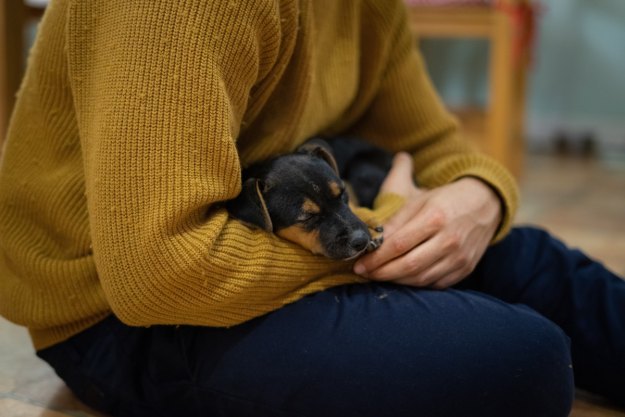Puppies are curious, playful, and, let's face it, messy. While normally a quick paw wipe or a brush will do the trick, what should you do when your little bundle of energy jumps into a mud puddle? When can you bathe a puppy? You may be wondering if your new pup is too delicate and small for a bath.
While we understand your apprehension about using shampoo and other cleaning products on a small guy, we’re here to put your concerns to rest once and for all. So, when is the right time to give your new pet his first bath? We've got the answers — plus a few tips on how to make bath time enjoyable for you and Fido.
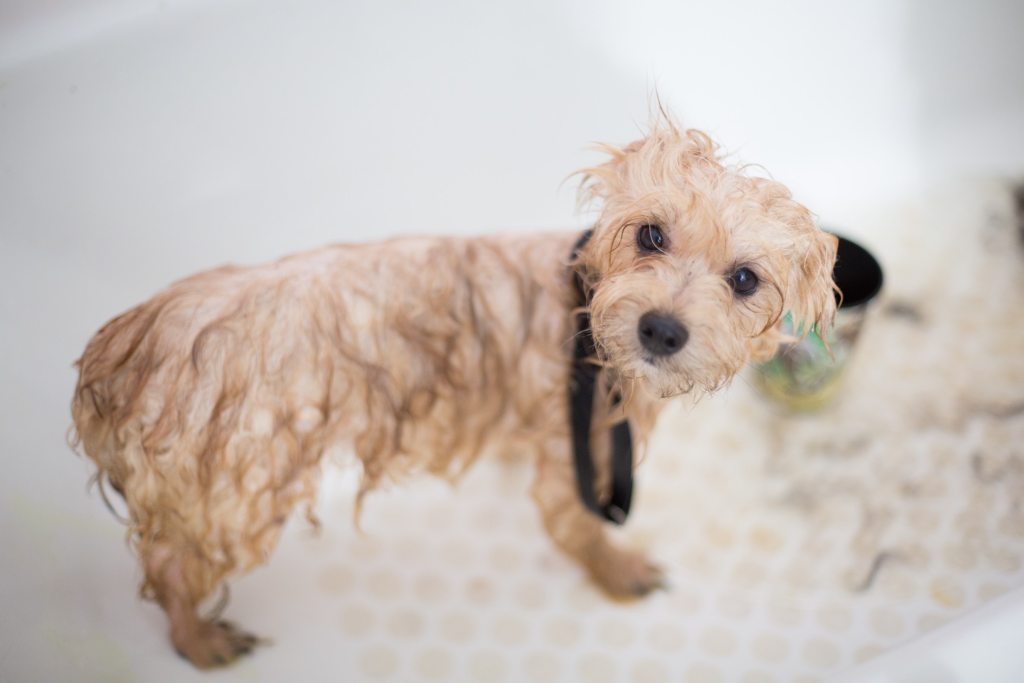
How old is your puppy?
Young puppies can’t regulate their own body temperature the way older dogs can, so the American Kennel Club recommends that you wait until they’re at least 8 weeks old before you give them their first bath.
Make sure you bathe them in a nice, warm room with plenty of towels on hand (you're gonna need them). If your puppy is shivering, the water isn’t warm enough. After your dog is clean, wrap them up in a few towels. You can use a hairdryer to dry them off quickly but make sure it's not too hot (some have a cool setting you might use). Start this method at a young age, so they won’t be frightened of — or bark at — hair dryers when they get older.
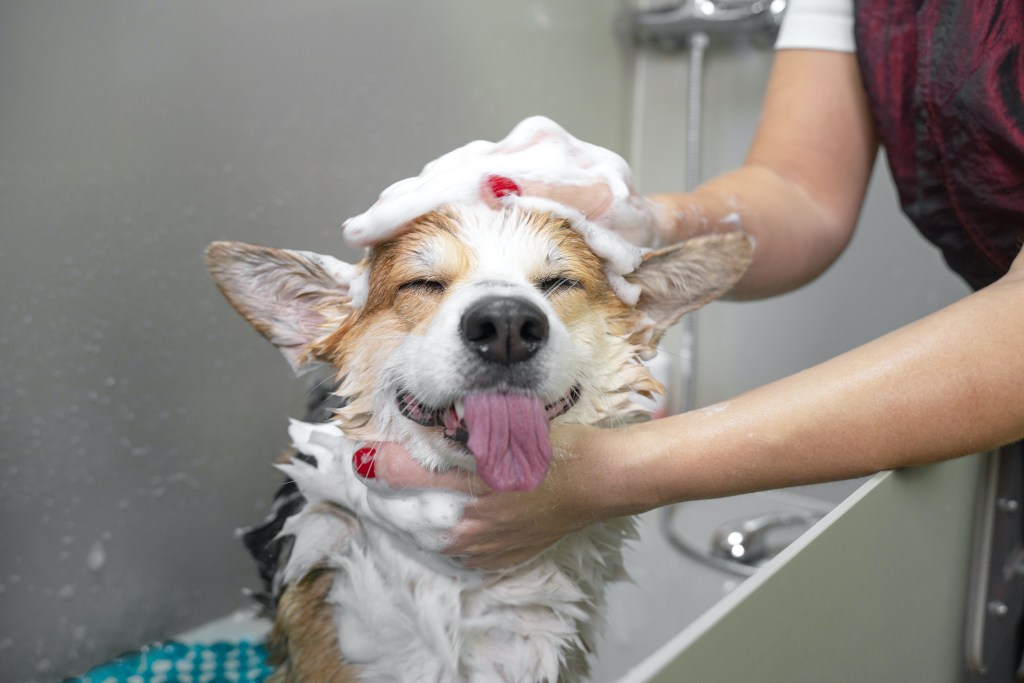
When can you bathe a puppy?
Bathing your puppy too frequently can strip their coat of essential oils and potentially lead to dry, irritated skin. Depending on the breed, your pooch will typically need a bath around four times a year unless they get especially dirty. If they have a dense, curly coat, they’ll need a bath every two months to prevent debris from becoming trapped in their fur.
Some breeds have double coats, consisting of a long outer coat and a softer undercoat. Akitas, huskies, Alaskan malamutes, and German shepherds shed twice a year, during spring and fall, so it’s recommended you put them in the tub around the same time. That way, your dog stays nice and clean, and it helps remove excess fur as they shed.
Water-loving breeds , such as Labrador retrievers have unique, water-repellent coats that keep their undercoats dry while they swim. Unless your Lab is particularly dirty, you should only bathe them once every four months, as soapy water can penetrate your dog’s undercoat and trap moisture there.
For dogs with short, smooth coats, you may only need to wipe them down with a washcloth to keep them clean. Pet wipes are also a great option for dogs with this coat type.
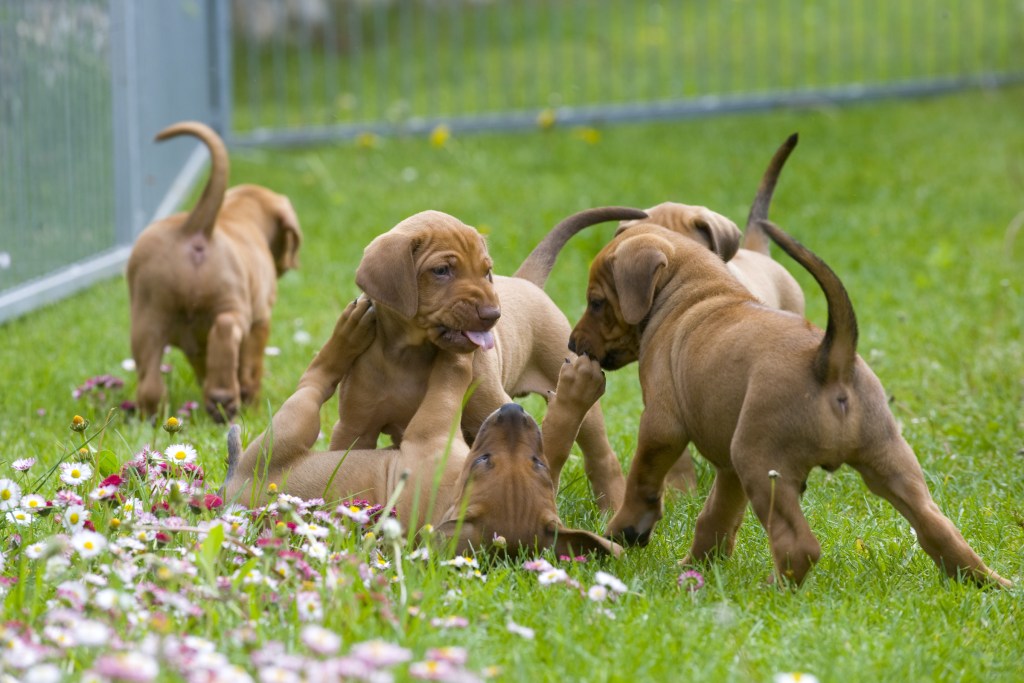
How often should you bathe your dog? More factors to consider
While it's useful to have a general rule, your exact situation could vary. For starters, many young dogs get into things and will be more likely to need that emergency bath (hopefully, they grow out of this in time). Beasties that spend a lot of time outside will definitely fall into this category.
In addition, you should take your pup's activity level into account, potentially upping the number of baths to bimonthly if it seems like your animal really needs it. Lastly, think about comfort — both yours and theirs. Some puppies get itchy skin that might require more frequent washing or specialty shampoo. Plus, you should bathe Fido enough that you don't wind up sneezing from too much fur.
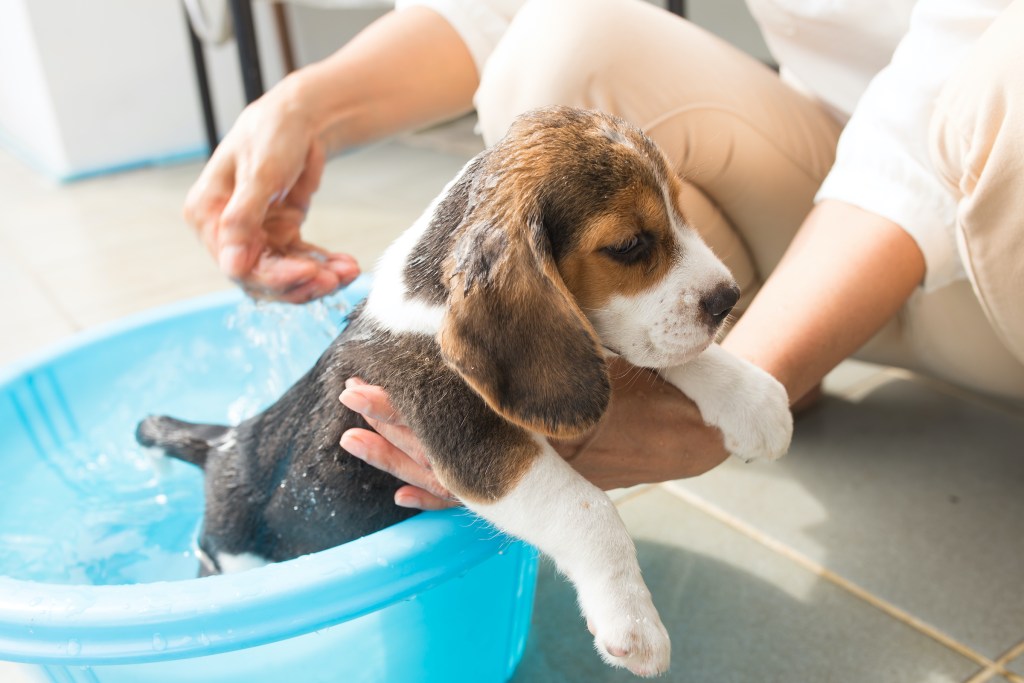
How to bathe your puppy in 9 easy steps
Before you even get started, it’s really helpful if you have an extra pair of hands to keep your puppy still throughout the process. Remember that it's important to teach them to tolerate or even enjoy baths since they'll have to endure a number of them over the course of their lives.
Step 1: Gather your supplies.
You’ll need a shampoo specifically designed for puppies, as their skin and fur have a different pH balance than yours. Using human shampoo on a dog can lead to skin irritation. You’ll also need a comb or brush, a stack of towels, and possibly a hairdryer.
Step 2: Pick the best location.
You can wash puppies and small dogs in your kitchen sink, while you should bathe large dogs in your bathtub or outside.
Step 3: Comb through their coat.
Grab the brush before you bathe them, or else what started off as a small tangle can become impossible to get through.
Step 4: Get the water ready.
Fill the sink or tub with dog-friendly temperature water — it should be around 102 degrees — and place your puppy in the water.
Step 5: Start slowly.
Many pups are afraid of moving water, so you may want to gently pour some over using a cup rather than spraying. Be sure to keep water out of your puppy’s ears and eyes. (Placing cotton balls in their ears and cupping a hand over their eyes is a good way to do this.)
Step 6: Work the shampoo.
Once your dog is wet, you can add a dollop of shampoo and work it into a lather. Hold them by the scruff of the neck to make things easier. Just make sure you clasp them gently and never pull too hard.
Step 7: Give them a rinse.
If they have a thick, dense coat, you may need to repeat the rinsing process several times. A few treats and plenty of praise will go a long way to improving the whole operation.
Step 8: Let them shake off.
Make sure you’re not wearing anything you don’t want to get wet. Then, grab a towel and go to work. The thinner your puppy’s coat, the less time they’ll need to dry. If your pooch seems chilled, try using a hairdryer on the lowest setting to warm them up quickly, and don’t let your puppy outside wet in cold weather.
Step 9: Clean up the mess.
It’s all part of the process, and your puppy won’t help you.
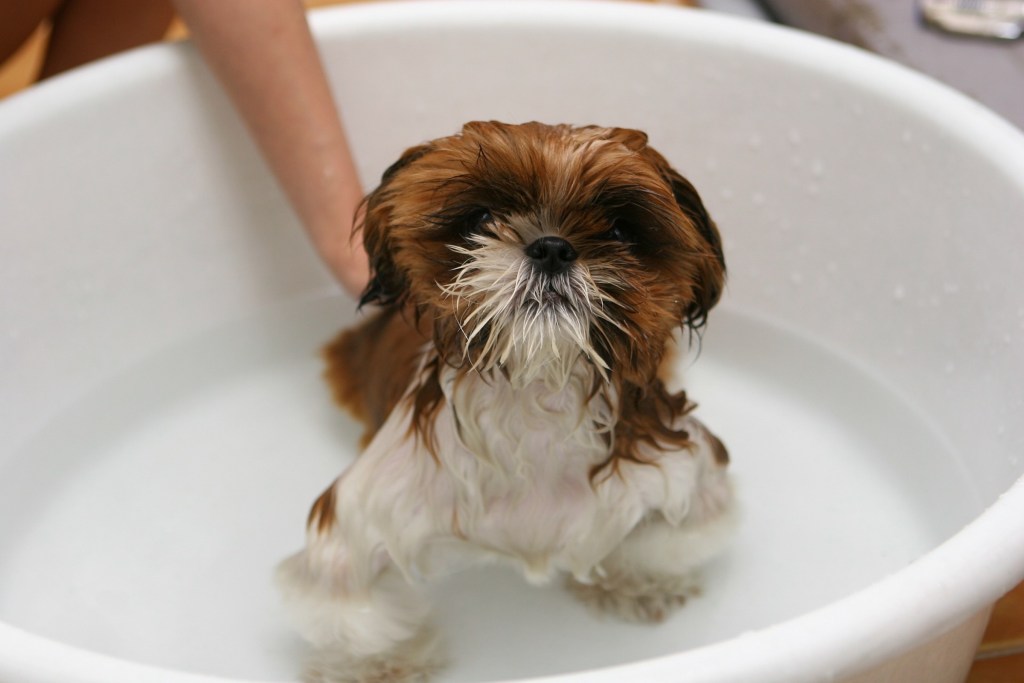
Can you use baby wipes on dogs?
According to Dr. Brite, using baby wipes on your dogs isn’t recommended, as baby wipes aren’t intended for that purpose. However, in a pinch, they should be fine as long as you don’t get any of the liquid from the wipes in your dog’s ears or eyes. But it’s not a good idea to use baby wipes exclusively. They won’t penetrate caked-on mud and dirt, and continued use can lead to skin problems.
Giving your puppy a wash is an action-packed experience, but after they get used to bath time, it will be much easier. Make sure your buddy stays nice and warm throughout the process, keep shampoo out of their eyes and ears, and never let your doggo go outside with wet fur if it’s cold out. Keeping your puppy’s coat clean and free of tangles means you’ll have a happy puppy and a clean home.
(And no one will judge you if you enjoy playing tug-of-war with a towel as much as your puppy does.)
If you’d like to learn more about your puppy or need a guide on how long puppies sleep, we’ve got you covered.
Editors' Recommendations
- What is littermate syndrome? Why this puppy bond can be a problem
- Why do dogs hump everything? You might be surprised
- Is a Belgian Malinois a good family dog? Everything you need to know about this amazing dog breed
- Why you should let your dog sleep in your bed every single night
- The best ways to pet your dog to show them how much you care




